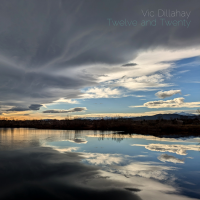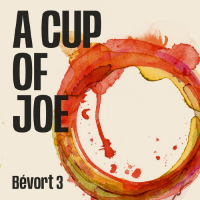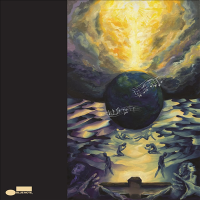Home »
Jazz Articles » Album Review » Big Bands on Radio 1933-52: The Music of Harold Arlen
Big Bands on Radio 1933-52: The Music of Harold Arlen
As one would envision from an anthology spanning a twenty–year period that preceded the advent of modern recording techniques and apparatus, sound quality varies widely on these radio air–checks from 1933 (Benny Goodman / Jack Teagarden, “I Got a Right to Sing the Blues”) to 1955 (the Dorsey brothers, “Let’s Fall in Love”). Of the sixteen selections (including two medleys), three are from the ’30s, eleven from the ’40s and two from the ’50s (Les Brown’s “Ill Wind” from ’52 and the Dorsey brothers track, which, unless the date is in error, must have been passed over when the album was designated
1933–52 ). All of the songs are by the wonderful Harold Arlen, and most are readily familiar, even though Arlen himself has faded into an undeserved semi–obscurity. Almost any music–lover can hum (or even sing) “That Old Black Magic,” “Let’s Fall in Love” or “Over the Rainbow,” but how many can name the author? Arlen’s compositions, among the finest ever produced in Tin Pan Alley, were widely played and appropriately praised during their time, and most have hung around to become what are referred to today as standards. Besides Goodman, Brown and the Dorseys, orchestras represented here include those led by Glenn Miller, Bob Crosby, Stan Kenton, Harry James, Raymond Scott, Woody Herman and Duke Ellington. Not a shabby cross–section of renowned big bands, nor are the vocalists — Teagarden, Herman, Dick Haymes, Ray Eberle, Johnny Mercer, Dinah Shore, June Christy, Dorothy Collins, Frances Wayne, Helen Forrest and Johnny Desmond. There are two versions of Arlen / Ted Koehler’s “Now I Know,” the first by the Ellington orchestra at New York’s Hurricane Club, the other (sung in German!) by Desmond from a 1944 “propaganda broadcast” by Glenn Miller’s orchestra (we were at war then, remember?). It’s interesting that the Herman orchestra’s treatment of “June Comes Around Every Year” is introduced by the emcee as “a Johnny Mercer tune” (Mercer wrote the lyrics, as he did for a number of other “Harold Arlen tunes”). It seems that even in 1945 Arlen, much like Rodney Dangerfield today, got no respect. Be that as it may, this is a pleasant stroll down memory lane and an explicit reminder of what a marvelous songwriter Harold Arlen was.
Track listing: Accentuate the Positive; I Got a Right to Sing the Blues; That Old Black Magic; This Time the Dream’s on Me; Between the Devil and the Deep Blue Sea; As Long as I Live; Let’s Fall in Love; Over the Rainbow; Hooray for Love / What’s Good About Goodbye / For Every Man There’s a Woman; My Shining Hour; Happiness Is Just a Thing Called Joe; Fancy Meeting You; Now I Know (Ellington); Now I Know (Glenn Miller); June Comes Around Every Year / I’ve Got the World on a String; Ill Wind (64:27).
Personnel
Orchestras led by Louis Armstrong, Benny Goodman, Tommy Dorsey, Glenn Miller, Bob Crosby, Jack Teagarden, the Dorsey Brothers, Stan Kenton, Harry James, Raymond Scott, Woody Herman, Duke Ellington and Les Brown.
Contact: Reflections, Absalongade 21A 3th DK
Album information
Title: The Music of Harold Arlen
| Year Released: 2000
| Record Label: Reflections
PREVIOUS / NEXT
Support All About Jazz

All About Jazz has been a pillar of jazz since 1995, championing it as an art form and, more importantly, supporting the musicians who make it. Our enduring commitment has made "AAJ" one of the most culturally important websites of its kind, read by hundreds of thousands of fans, musicians and industry figures every month.
Go Ad Free!
To maintain our platform while developing new means to foster jazz discovery and connectivity, we need your help. You can become a sustaining member for as little as $20 and in return, we'll immediately hide those pesky ads plus provide access to
future articles for a full year. This winning combination vastly improves your AAJ experience and allow us to vigorously build on the pioneering work we first started in 1995. So enjoy an ad-free AAJ experience and help us remain a positive beacon for jazz by
making a donation today.
 All About Jazz has been a pillar of jazz since 1995, championing it as an art form and, more importantly, supporting the musicians who make it. Our enduring commitment has made "AAJ" one of the most culturally important websites of its kind, read by hundreds of thousands of fans, musicians and industry figures every month.
All About Jazz has been a pillar of jazz since 1995, championing it as an art form and, more importantly, supporting the musicians who make it. Our enduring commitment has made "AAJ" one of the most culturally important websites of its kind, read by hundreds of thousands of fans, musicians and industry figures every month.






















